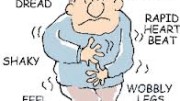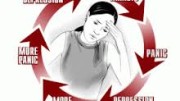 Richard Lazarus defined stress as “a condition or feeling experienced when a person perceives that demands exceed the personal and social resources the individual is able to mobilize.” There are two types of stress we humans experience. Eustress is a positive stress that allows us to focus and get things done in our daily life. Distress is the negative stress that can make us sick or lead to anxiety disorders such as panic attacks and PTSD.
Richard Lazarus defined stress as “a condition or feeling experienced when a person perceives that demands exceed the personal and social resources the individual is able to mobilize.” There are two types of stress we humans experience. Eustress is a positive stress that allows us to focus and get things done in our daily life. Distress is the negative stress that can make us sick or lead to anxiety disorders such as panic attacks and PTSD.
According to Emergency Care, “ signs and symptoms of stress include irritability with family, friends and coworkers; inability to concentrate; changes in daily activities, such as difficulty sleeping or nightmares, loss of appetite, and loss of interest in sexual activity; anxiety; indecisiveness; guilt; isolation; and loss of interest in work.”
Stress management includes eating healthy, exercising and setting time aside for relaxing. The American Heart Association recommends: 1) positive self-talk; 2) emergency stress stoppers such as counting to 10 or going for a walk – see AHA link below for a full list; 3) finding pleasure – “Doing things you enjoy is a natural way to fight off stress.”; and, 4) daily relaxation such as yoga, tai chi, meditation, and deep breathing. WebMD adds to the list: write for 10-15 minutes per day, releasing feelings (laugh, cry, talk), focusing or staying in the present through meditation, breathing techniques and mindfulness, and using guided imagery where find your happy place.
The Holmes and Rahe Stress Scale is an excellent identification tool of stressors one may not realize they have going on in their life. “Stress Management: Manage Stress. Be Happy and Effective at Work” is an excellent resource for stress management and is loaded with tools to assist in gaining control of stressors. https://www.mindtools.com/pages/main/newMN_TCS.htm. Take their “Are you a Positive or Negative Thinker” quiz at https://www.mindtools.com/pages/article/newTCS_89.htm.
“A man is but a product of his thoughts. What he thinks, he becomes.” – Mahatma Gandhi
Further reading:
American Heart Association. “Four Ways to Deal with Stress”. http://www.heart.org/HEARTORG/GettingHealthy/StressManagement/FourWaystoDealWithStress/Four-Ways-to-Deal-with-Stress_UCM_307996_Article.jsp#.Vp6MJhZLBJ0
Image from findwallpapershd.com.



